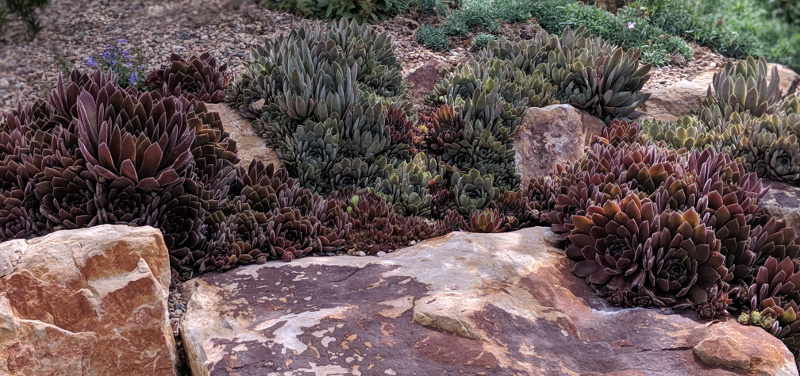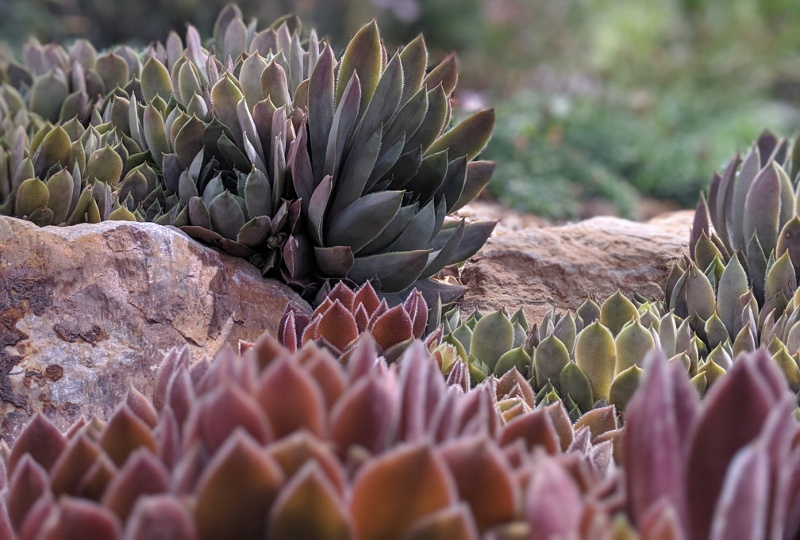Hens and chicks (Sempervivum tectorum) are fun and easy succulents to grow and they are safe plants around dogs, cats and horses. Hens and chicks have only low toxicity in children and adults. The leaves, or pads, of hens and chicks carry alkaloids that are considered poisonous because they can cause short periods of low toxicity if eaten.
Some people also can get contact dermatitis, or a red and itchy rash, from the sap in the leaves' cells. Other succulents in the hens and chicks family (Crassula) are considered more toxic. The minor toxicity from the plant is not fatal to animals or people.

In fact, there is some evidence of medicinal use of extracts from hens and chicks plants as antioxidants, but anyone considering eating the plants should limit the amount or seek further instructions on safe extraction and use.
Are Hens and Chicks Poisonous to Children
Children are curious and toddlers might think the fleshy leaves of hens and chicks look good enough to eat. It is best to keep curious young ones away from the plants, but if a child takes a bite of a leaf or flower, it likely is not serious. The plant is considered low poison severity. A child might be sensitive to the sap from leaves. If skin redness develops, it should pass in a short time.
Are Hens and Chicks Poisonous to Dogs
A curious puppy or mature dog is probably more likely to nibble on the dirt around a potted hens and chicks than on the plant. The stem is not aromatic, so the plant should not attract pets. If a puppy gnaws on part of a sempervivum plant, there typically is no need to call a veterinarian.
Are Hens and Chicks Poisonous to Cats
The pretty rosette shape and various colors of hens and chicks varieties might attract a kitten or cat. Still, there is no evidence that the plants are toxic to felines.
Are Hens and Chicks Poisonous to Other Animals
Horses will not be poisoned by eating hens and chicks, and there are no reports of the plant being toxic to other animals.

Symptoms of Hens and Chicks Poisoning
The symptoms related to ingesting hens and chicks are not well known, since they are not severe. Skin irritation from the sap can cause redness, itching and some burning, but will not last
- Hens and chicks have only low toxicity, and symptoms of eating the plant are unknown
- The sap in leaves can cause short-term skin irritation leading to itching and redness
To prevent anything bad from happening in the first place, you can use physical barriers such as decorative fencing to prevent children or animals from getting too close for a taste. Dogs and cats can sometimes suffer from a nutrient deficiency if they continually gnaw on certain things so it might be time for a thorough check up from your vet to check on your pets health. There are also animal deterrent products on the market that can help prevent animals from chewing on plants.
Pet Poison Helpline
If something were to happen to your furry friend, and you suspect that they are suffering from (insert plant) poisoning, there is a poison control hotline to call for 24/7 vet advice. It is called Pet Poison Hotline, and their phone number is (855) 764-7661.
Click here for a complete list of Pet Safe Plants.
Sources:
"Hens and Chickens." American Society for the Prevention of Cruelty to Animals. aspca.org
"Sempervivum." North Carolina Extension Gardener Plant Toolbox. plants.ces.ncsu.edu
 |
Author Teresa Odle - Published 12-16-2020 |


